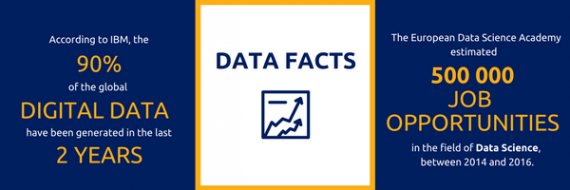Graduated students will be able to take job roles that require high level of responsibility in many areas, such as research centers, computing laboratories, societies that deal with Big Data, financial institutions, biomedical and pharmaceutical industries.
Graduates could enter directly the business world or continue their studies with a PhD.

According to IBM 90% of the global digital data has been generated in the last 2 years and the McKinsey Global Institute has estimated that data will increase by 40% per year until 2020 (source: Report on Big Data, MIUR).
Inevitably, the technological evolution and the increasing presence of data in everyday life have changed the job market: we need new experts (source: WEF2016). This is the reason why in Italy, from 2015 to 2016, there was an increase of the 76% in the request of professionals in data science (source: Report on Big Data, MIUR)
The European Data Science Academy confirmed this growing trend also for Europe: it estimated 500 thousands of job offers in the field of data science – data management, data analytics, HPC professionals – between 2014 and 2016 (source: European Data Science Academy).
This trend is going to increase. As an example, the Europea Union estimates the need of 500 thousands data professionals in the next ten years only to manage the new European Open Science Cloud infrastructure (source: High Level Expert Group on EOSC).
Just in case, check the position of data science among the most cool jobs in the rank of CareerCast 2016, or what the Harvard Business Review says.

